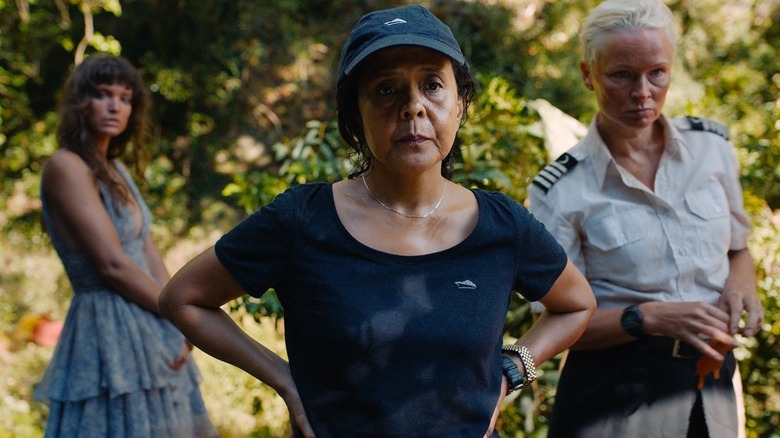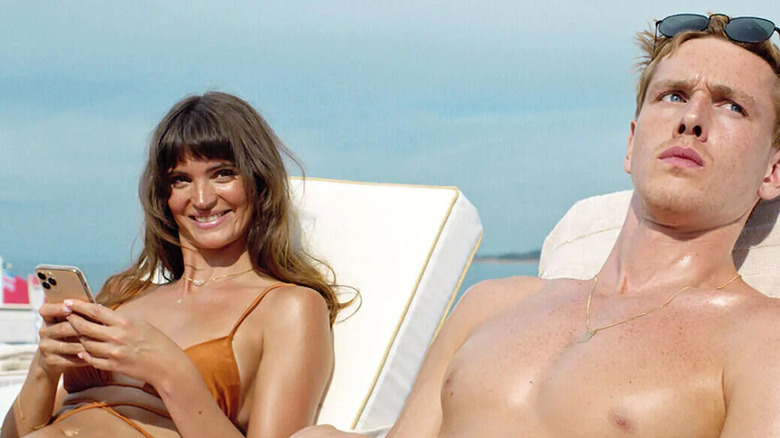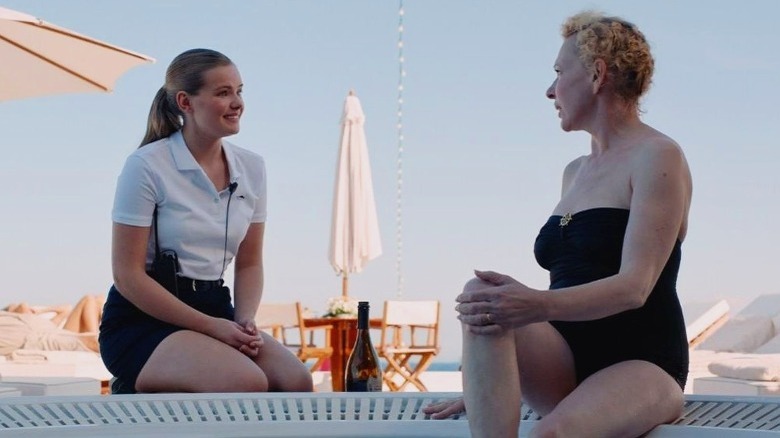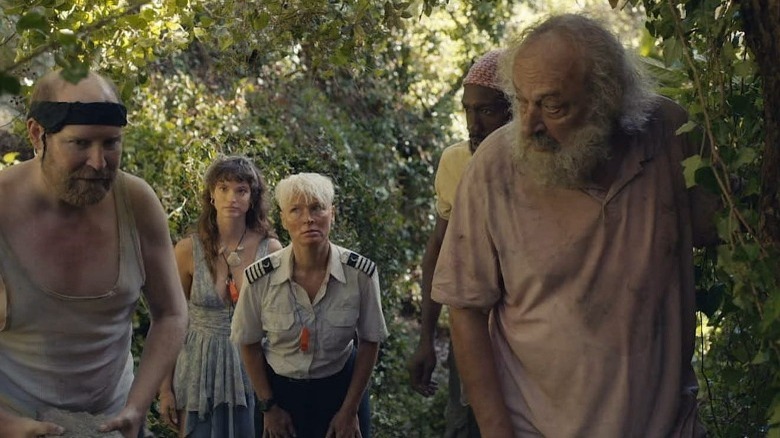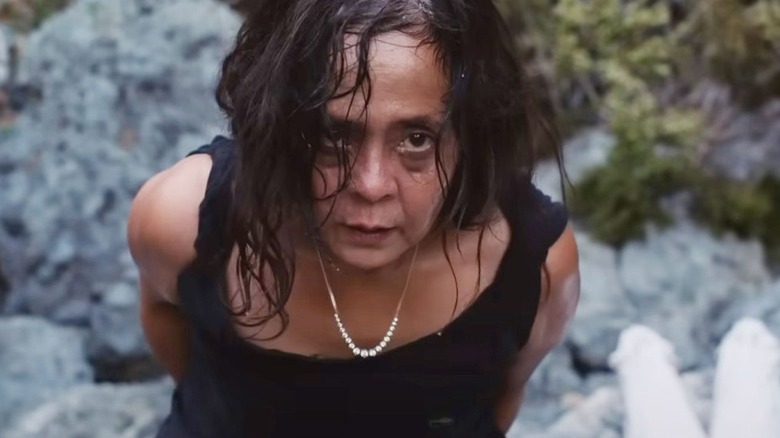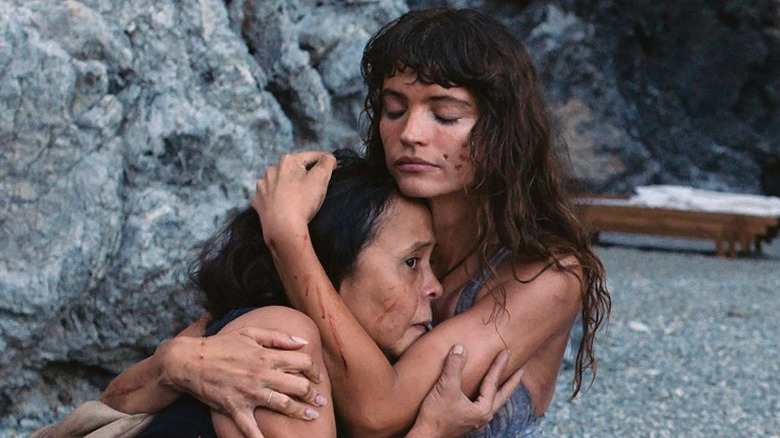Triangle Of Sadness Ending Explained: Models, Grenades, And Bodily Fluids
With his 2022 film "Triangle of Sadness," Ruben Östlund's characteristically arch satirical sensibilities were applied to the worlds of the ultra-wealthy. As the Swedish filmmaker put it in 2017, he always wants his work to feature some "combination of sociology, stand-up comedy, and horrifying awkward moments." In "Triangle," he gets all three — and an added bit of masterful gross-out comedy, as patrons of a luxury cruise fall into a bad fit of food poisoning in the chaos of a stormy night aboard. For a director who is fond of disgusted walk-outs, even this scene veers close to too-much territory. Using his intercom, the Captain (Woody Harrelson in a winning, too-brief performance) explains his Communist philosophy all the while.
It's a wild ride from its opening scene, set in the competitive world of male modeling, to its conclusion, in the seemingly isolated jungles of an uncharted island. In the most literal way, all the movie's doing is following the journey of a young couple of models, from high-end urban culture to that island, where all they've built is put to the task. Removed from wealth, all they have is what gave them access to luxury in the first place — their good looks. That won't take them far when removed from civilization. Or will it?
The other goal that Ruben Östlund sets for his films, according to an interview with Vanity Fair, is to ask essential questions about the human condition in modern times, like, "Who do we want to be? What kind of society do we want?" By "Triangle's" final act, we get to see a new society in motion.
Relax your triangle of sadness
Like its title suggests, "Triangle of Sadness" is a triptych, with three distinct chapters. Its first chapter introduces protagonists Carl (Harris Dickinson) and Yaya (Charlbi Dean), two models at different levels in their career.
While Carl is far from schlubby, there is an obliviousness to him, an ignorance to how the world works. In his opening scene, we see a particularly uncomfortable male model photoshoot that gets handsy, with wide shots and minimal cutting to add to the awkwardness. You could never accuse Ruben Östlund of objectifying the models here. The men are instructed to relax their "triangle of sadness," the area between the bridge of the nose and the forehead, where brows get furrowed and people express a world of feelings. That kind of expression is above these models' pay grades.
Meanwhile, Yaya is wildly successful, and she covers the check at a high-end restaurant after a long and complex debate. Rather than the expected glitz and glamor of the modeling lifestyle, Östlund spends this first chapter focusing on the colder, pragmatic side of things. The two serve each other, even if Carl is getting the appearance of a loving relationship and Yaya is getting the opportunity to be a social media climber.
Chapter two brings the couple to a luxury yacht, where Yaya gets Carl to take pictures of her on the deck, the ocean behind her. One of the big gags of the movie, like the same year's "The Menu," is that the characters get to experience the joys of their obscene wealth and access without ever enjoying or meaningfully engaging with any of it. Here, Carl and Yaya meet others with the same philosophy.
Food poisoning
On the boat, the movie's themes are hammered in even further. The head of staff Paula (Vicki Berlin) is a veritable tyrant, ordering her crew obey the wishes of every passenger onboard, and one crew member is even let go after Carl becomes jealous over Yaya's attraction to him. On the kitchen crew is Abigail (Dolly De Leon), an unassuming Filipino woman who continues to do her job, even going into the ocean when one passenger demands it.
That results in a massive bout of food poisoning, which results in the chaotic vomit-and-other-fluids setpiece for which the movie has become known, one in which the dining room is turned into a battlefield. The wealthy passengers might be worth billions, but that doesn't necessarily mean they're worth listening to.
By sunrise, the passengers are given some clarity from the chaos. In fact, Winston (Oliver Ford Davies), a British weapons manufacturer, gets to observe it peacefully with his wife. He doesn't get long before one of their own grenades is tossed on his balcony by pirates, blowing up the boat and forcing the surviving passengers to the island, kicking off the movie's third and final act.
There's only a handful of survivors who make their way to the beach, including Carl, Yaya, and Abigail. Among the group, only one has the capabilities necessary to survive on hostile terrain. And it's not one of the billionaires (including a tech billionaire and a Russian oligarch), nor is it one of the models. It's Abigail.
The power of Abigail
Abigail quickly takes control of the situation, catching fish off the shore and cooking it as well. With access to a private bedroom in the lifeboat and control over the castaways' eating situation, she is soon seen as the leader. She forces Carl into a sexual relationship, one that sparks the jealousy of Yaya, who, with the tables turned on her, can't even get the former service worker fired like Carl could.
Abigail may not have spoken a word in the boat scenes, but here she is unstoppable. It may not be subtle social commentary that the castaways, worth billions in their past lives, are now reduced to servicing someone else. But Ruben Östlund rarely seems interested in subtlety, and more in the way you can play with bluntness to delicious, devastating effect. That's what makes the satire of "Triangle" so biting.
If much of the ensemble of "Triangle" is made up of one-dimensional caricatures, we still remember those early scenes of Carl and Yaya.
What can jealousy drive somebody to do? When Yaya decides to go on a hike, and Abigail accompanies her, there is a hint of danger in Yaya's behavior. We've seen her judgment of Abigail's treatment of Carl, and he is suspicious too. But as their hike goes on, Yaya and Abigail find they're on a resort island – they were just on the wrong side of it the whole time. A whole beautiful materialistic world awaits them.
And as Yaya talks about how she can't wait to join civilization again, and that she'll even offer to hire Abigail, the movie cuts to Abigail holding a rock above her, ready to drop it. After a brief shot of Carl running, the movie ends.
Indecision
"Should she drop it to the ground or should she kill her?" is just one of many hypothetical questions Ruben Östlund asked himself about the ending of "Triangle of Sadness," per Slant Magazine. The ambiguity of the moment and what comes next is a perfect note for a movie dealing with wealth, class, and power, with all the expected questions of how sexuality and violence factor in. If you want to know how a director of unconventional films was able to score an Oscar nomination with this movie, much of it has to do with the nuances of this moment, even for a largely unsubtle movie.
As Östlund told the Hollywood Reporter, he wanted Abigail "to take command immediately." Because of the degree to which she runs operations on the island, her character immediately becomes quite complex. Promoting the film, Dolly De Leon told GQ, "I've always felt discriminated upon because of my stature in life, in the same way that Abigail does in the film."
Given the chance to lord over the people she has been forced to serve all her life, she immediately takes it. And it makes sense she would kill Yaya, given the way she's historically been treated. Yaya could destroy the precious and fragile civilization Abigail has built, just by informing them of the resort.
Even if Abigail is justified in her own mind, there's still many reasons not to go through with the murder. Yaya's biggest crime up to that point in the movie was possibly being Instagram-obsessed and a little cruel to her romantic partner. Thus the hesitation.
In the clouds
One other thing the movie does in its final chapter is hint at the true nature of the island just before the final reveal.
While Therese (Iris Berben), a German stroke survivor who can only say one phrase, "in den Wolken" (literally, "in the clouds"), is bathing, she notices what looks to be members of a local tribe. As they show up to her and offer her wares, we realize something is off, and by the end of the movie, it's clear that they are vendors, in costume for the resort. But even if she is suspicious, she has nobody to voice her suspicions to, or who can understand her. Should Abigail go through with the murder of Yaya, there will be nobody to hold her accountable.
Unlike the "eat the rich" ending of "The Menu," there is no righteous conclusion for the monstrous wealthy characters. Just a dark and ambiguous moment, one whose potential consequences seem distant. We already got the cathartic humiliation of the rich with the food poisoning, but many of the survivors seem comfortable in their new subservient lifestyle. And their trained obliviousness, whether it's to the emotional lives of their partners or to the suffering of their service workers, means they are likely to never discover that they are on a resort — unless Carl catches up.
